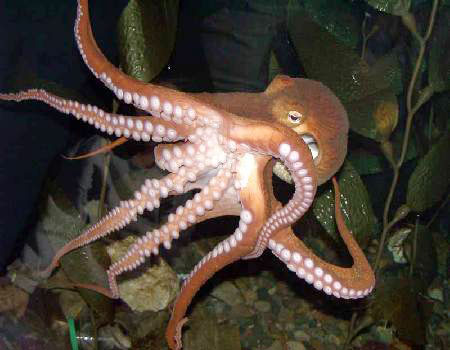Octopus is smarter than we thought
In case you think the octopus is believed to be the only smart ability to guess the outcome of football matches (for example, Paul octopus, in Germany has chosen the right, all football teams Stone will win right away in 2010 World Cup, in Johannesburg, South Africa?) , recently, scientists at Hebrew University, in Jerusalem, Israel, discovered octopus not only smart, but also can do some complex coordination actions quite well .
Octopus is one of the most developed invertebrates. They have big brains and are able to learn quickly. With 8 rigid arms and bones, they performed many tasks such as data collection, mating, swimming and hunting. Unlike most vertebrates like humans, which are confined to their movements by possessing a hard skeleton, and determining the fixed position of the limbs; Octopus species can perform unlimited mobility.

Octopuses are not only intelligent, but they can perform a variety of things
coordinated movements performed by a single arm very well.
Because octopus does not have a rigid bone structure, it was previously believed that octopuses had only active control limited to their flexible 8 arms (6 arms and 2 legs). However, researchers at the Hebrew University, Israel, showed the opposite: They developed a labyrinth, with three transparent mica sheets for the octopus to choose, and forced the octopus to use Use a single arm and look directly at the eye to identify a reward section for its food, marked and placed outside the lake.
The octopus in the test learned how to insert a single arm through a central tube, out of the lake, and on the right target to be marked for food rewards. This success depends on visual information, which the octopus can turn into a series of coordinated movements performed by a single arm and get food. The octopus can also repeat this process.
The completion of the mission shows that for the first time an octopus can directly use a single arm in a complex motion to reach the target . The problem is the octopus's ability to control muscles, which is the basis of a research project, conducted by the European Union, in order to build an " Octopus Robot ". To understand how octopus controls its movement, and to what extent control. This is an important basis for the design of the control architecture of a robot without rigid skeletons.
The results of the study are published in the Journal of Biology, by authors: Tamar Gutnick, Professor Binyamin Hochner and Dr. Michael Kuba, working at the Center for Neuroscience, at the Institute of Life Sciences. living Alexander Silberman, Hebrew University, Israel and Dr. Ruth A. Byrne, working at Vienna Medical University, Austria.
- Octopus - one of the smart species does not use the brain
- Detecting octopus 'super small' at sea
- The genius of the ocean? Please call the octopus name!
- Training octopus into the world's first photographer
- Video: Found strange octopus near Hawaii
- The little-known dark secret of the octopus has now been discovered by science
- Scientists absolutely warn against raising octopus
- The video of the octopus escapes the egg bag causing fever in the online community
- Octopus species have an odd sex life
- 'Octopus city' under the sea floor of Australia
- Miraculous stealth of octopus in the Caribbean Sea
- Giant octopus is not mated because it is easy to eat mates
 Animal 'suffering' after hibernation
Animal 'suffering' after hibernation Why do goats climb well?
Why do goats climb well? Scientists were surprised to see chimpanzees eating turtles
Scientists were surprised to see chimpanzees eating turtles Giant catfish died deadly due to drought in Thailand
Giant catfish died deadly due to drought in Thailand Four new species appear as 'hybrids' of extraterrestrial creatures
Four new species appear as 'hybrids' of extraterrestrial creatures  First time filming the moment an octopus shoots rocks at predatory fish
First time filming the moment an octopus shoots rocks at predatory fish  Octopus jumps on the seabed 4,800m deep
Octopus jumps on the seabed 4,800m deep  The octopus sacrifices its arm to escape the eel
The octopus sacrifices its arm to escape the eel  Diver gets scared when being led by an octopus to a tombstone on the seabed
Diver gets scared when being led by an octopus to a tombstone on the seabed  Why do octopuses eat eggs and gnaw their hands?
Why do octopuses eat eggs and gnaw their hands? 